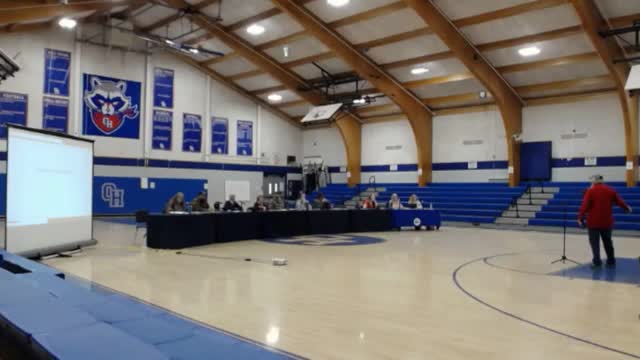RSU 04 board moves Sabatus Primary closure question to voters; public hearing details services, costs and timelines
Get AI-powered insights, summaries, and transcripts
Subscribe
Summary
The RSU 04 school board voted to place a question on the April 8 referendum asking voters to authorize closure of Sabatus Primary School. At a March 19 public hearing, administrators and residents discussed how students and services would be redistributed, projected savings and outstanding facility and transportation concerns.
RSU 04 school officials will ask voters whether to close Sabatus Primary School in an April 8 referendum after the district’s board voted in January to send the question to the ballot and the state Department of Education approved paperwork in February.
At a March 19 public hearing, Nicole, a school board member, opened the meeting by outlining the timeline leading to the vote and asking the public to review materials posted on the district website. “So this evening, we have a lot of information to go over with you, to discuss the, decision to send to the voters a question regarding closure of Sabato's primary,” Nicole said.
Why it matters: The board and district leaders said closing Sabatus Primary would let the district focus capital and maintenance dollars on fewer buildings and reduce annual operating costs. Katie, the district superintendent, told attendees the consolidation committee — about 25 people representing all three towns — recommended the closure after facility tours and analysis. “We can fit Sabatus Primary, the staff, the students, into those 2 schools,” Katie said, and she added, “so there’s no reduction in teaching staff” as the district designs new classroom assignments at the receiving schools.
Key timeline and approvals: According to administrators, the consolidation committee considered closing both elementary buildings but recommended closing Sabatus Primary first. The board voted on Jan. 8 to take the closure question to voters; the district submitted materials to the Maine Department of Education (DOE), which notified the district on Feb. 20 that the paperwork had been approved, and the board called the referendum and signed warrants on Feb. 26. The public hearing on March 19 reviewed the materials and answered residents’ questions in advance of the April 8 referendum.
What the question asks and the stated cost estimate: At the hearing the board displayed the referendum language and a figure listed as the additional cost of keeping Sabatus Primary open: $358,076.69. Nicole and district staff directed residents to the district website, where maps, staffing models and two draft budgets — one with Sabatus open and one with it closed — are posted.
How students and services would move: Katie and other administrators outlined the planned reassignments if the closure is approved. Pre-kindergarten would move to Carrie Ricker (behind the gym, with a separate entrance), and Libby Tozier would host kindergarten and early grades; the district provided staffing counts and said specialist positions (music, art, physical education, library), school counselors and special-education staff would continue to cover the consolidated campuses. The district said some custodial, food-service and one IT position would be eliminated because of the reduced number of buildings, and some custodial and food-service capacity would shift to the larger receiving schools.
Capital and maintenance priorities: Administrators said closing Sabatus Primary would let the district concentrate capital-improvement dollars on Libby Tozier, which also needs significant work. Mark Taylor, director of operations, outlined needed projects across buildings — flooring, window sills, roof and HVAC work — and said the district has applied to the DOE’s major construction list but will not know rankings until August. The board is also considering using money already in fund balance for initial repairs once a decision is made.
Public concerns: Dozens of residents asked questions at the hearing. Transportation and bus times were frequent concerns: residents described long pickup routes, transfers at Sabatus that lengthen rides, and worries about increased parent pickup congestion at receiving schools. A resident, Jim Waterman, asked what would happen if Litchfield withdrew from the regional unit; Katie answered that any outstanding debt on remodeled or newly improved buildings would likely stay with the withdrawing municipality and that withdrawal would require lengthy negotiations about how students would be educated.
Health and building conditions were raised repeatedly. Diane, a retired district teacher, described respiratory illnesses she attributed to building ventilation at Sabatus and told the board she saw health improve after moving classrooms. Other residents questioned the district’s long-term repair estimates and asked whether demolition or remediation costs for the vacant building might fall to the town if the town accepts the property.
What happens to the Sabatus property: Administrators said the town of Sabatus will have first refusal to accept the building and property for municipal use. If the town declines, the district must offer it to charter schools that serve district students; if no charter school is interested, the district would put the property on the market and use sales revenue per district policy.
Next steps: The district will hold its referendum on April 8; administrators reiterated that absentee-ballot information is available now. Separately, the board and staff are proceeding with two budget models — one that assumes Sabatus stays open and one that assumes closure — and will present budget information for voter consideration at the district’s public budget meeting and workshops.
Board members and district staff asked residents to review the posted materials and submit any additional questions via the district website. The board closed the hearing and moved into a scheduled budget workshop.
Ending: The referendum question and supporting materials remain posted on the RSU 04 website; officials said they will publish answers to submitted questions and continue community briefings through the April vote.
